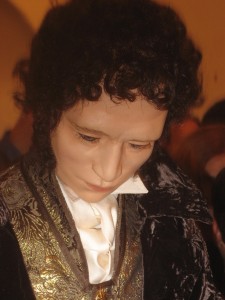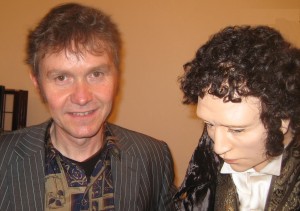By Marylene Delbourg-Delphis @mddelphis
 From the science of automata to love stories with androids: Think about Wilhelm Schickard‘s “calculating clock” in 1623 and, almost two hundred years later, of Charles Babbage’s first mechanical computer, the difference engine, and about the many inventions in between: Pascal’s Pascaline (1642), Leibniz’s Stepped Reckoner (1672), the dozens of mechanical calculators that were built during the 18th Century, or Jacquard‘s automatic loom. Starting in the 17th century the word “automaton” (which means the ability to act or move of one’s own will in Greek) became a household term among scientists and philosophers, as well as entertainers throughout Europe – and a cause for endless marveling in the 18th century. While Leibniz, inventor of calculus, described the soul as an admirable “spiritual automaton” in his Théodicée, Jacques de Vaucanson (1709 –1782) and Pierre Jaquet-Droz (1721–1790) fueled the imagination of kings and queens as well as of laymen with their humanoid automata. Few of them still work, but you may want to take a look at the tympanum player by clockmaker Peter Kintzing (1746-1816), or take a few minutes to watch Pierre Jaquet-Droz‘s marvels: the Musician, the Scribe and the Draftsman (start at the 6th minute if you are in a hurry). Automaton fantasies spread throughout the 19th century, inspiring countless writers and composers, until Villiers de l’Isle Adam popularized the term “Andreid” in his story Tomorrow’s Eve (1886). In it, a love-sick aristocrat, Lord Celian Ewald is close to committing suicide at the time he visits an American inventor called Edison — who exhorts him to wait for twenty-one days and meet the ideal artificial woman.
From the science of automata to love stories with androids: Think about Wilhelm Schickard‘s “calculating clock” in 1623 and, almost two hundred years later, of Charles Babbage’s first mechanical computer, the difference engine, and about the many inventions in between: Pascal’s Pascaline (1642), Leibniz’s Stepped Reckoner (1672), the dozens of mechanical calculators that were built during the 18th Century, or Jacquard‘s automatic loom. Starting in the 17th century the word “automaton” (which means the ability to act or move of one’s own will in Greek) became a household term among scientists and philosophers, as well as entertainers throughout Europe – and a cause for endless marveling in the 18th century. While Leibniz, inventor of calculus, described the soul as an admirable “spiritual automaton” in his Théodicée, Jacques de Vaucanson (1709 –1782) and Pierre Jaquet-Droz (1721–1790) fueled the imagination of kings and queens as well as of laymen with their humanoid automata. Few of them still work, but you may want to take a look at the tympanum player by clockmaker Peter Kintzing (1746-1816), or take a few minutes to watch Pierre Jaquet-Droz‘s marvels: the Musician, the Scribe and the Draftsman (start at the 6th minute if you are in a hurry). Automaton fantasies spread throughout the 19th century, inspiring countless writers and composers, until Villiers de l’Isle Adam popularized the term “Andreid” in his story Tomorrow’s Eve (1886). In it, a love-sick aristocrat, Lord Celian Ewald is close to committing suicide at the time he visits an American inventor called Edison — who exhorts him to wait for twenty-one days and meet the ideal artificial woman.
2010: The most complex android automaton today: Alexander Pushkin: Forget about all the computerized predictable robots of today and take a look at an amazing, non-computerized, and non-predictable piece of art, Pushkin:
Almost 37 inches tall and weighing 122 pounds, Pushkin blinks and breathes as he hand-writes and signs one of 1,458 poems with his Caran d’Ache pen. Here is an automaton in the grandest tradition, with extremely smooth and refined movements, yet considerably more complex than all historical automata combined. It’s also an android in a most beautiful tradition, as the founding father of modern Russian literature, Alexander Pushkin (1799-1827), now writes for eternity illustrated love verses. That’s where the innovative uniqueness of Pushkin lies: while all automata so far have only offered predefined sets of words and drawings, Pushkin composes hundreds of different, sensical poems (with a drawing corresponding to the theme of each one) — a level of combinatorial intelligence hardly imaginable in mechanical computing.
 No wonder the project took seven years to complete! It’s not a surprise that it propels its designer, François Junod, an already celebrated automaton maker from Sainte-Croix (in the heart of watch-and clock making country between La Chaux-de-Fonds and Geneva) to the top of the automaton artistic medium. François has pushed the limits of the genre thanks of his outstanding knowledge of micro-mechanics, his deep personal artistic creativity and culture, but also his ability to attract talents, such as Thomas Ortlieb, Nicolas Court, Fabienne Roth and many others, who were indispensable to complete such a daunting project. It was not only a huge task to custom-create almost 4,000 components (along with some of the instruments to build them), it was even more challenging to address a host of application issues, ranging from the size of these components to the impact of their mass with a 2 micron precision requirement.
No wonder the project took seven years to complete! It’s not a surprise that it propels its designer, François Junod, an already celebrated automaton maker from Sainte-Croix (in the heart of watch-and clock making country between La Chaux-de-Fonds and Geneva) to the top of the automaton artistic medium. François has pushed the limits of the genre thanks of his outstanding knowledge of micro-mechanics, his deep personal artistic creativity and culture, but also his ability to attract talents, such as Thomas Ortlieb, Nicolas Court, Fabienne Roth and many others, who were indispensable to complete such a daunting project. It was not only a huge task to custom-create almost 4,000 components (along with some of the instruments to build them), it was even more challenging to address a host of application issues, ranging from the size of these components to the impact of their mass with a 2 micron precision requirement.
Pushkin, who died after challenging Georges d’Anthès to a duel, has resumed a new life in Sainte-Croix. People came to admire the latest Swiss marvel evolve and improve; many journalists sent him emotional goodbyes as he left the country, carefully dismounted. Gerald Cordonier, a journalist for 24 heures even followed to the “virgin woods of young America.”

0 responses so far ↓
There are no comments yet...Kick things off by filling out the form below.
Leave a Comment